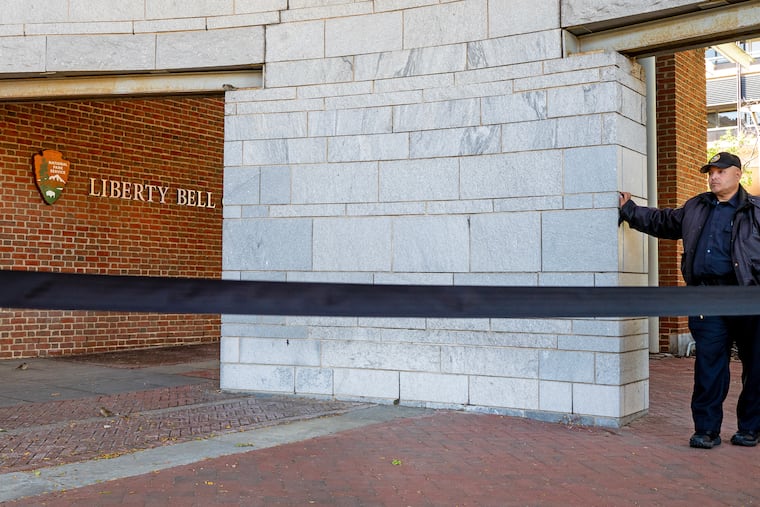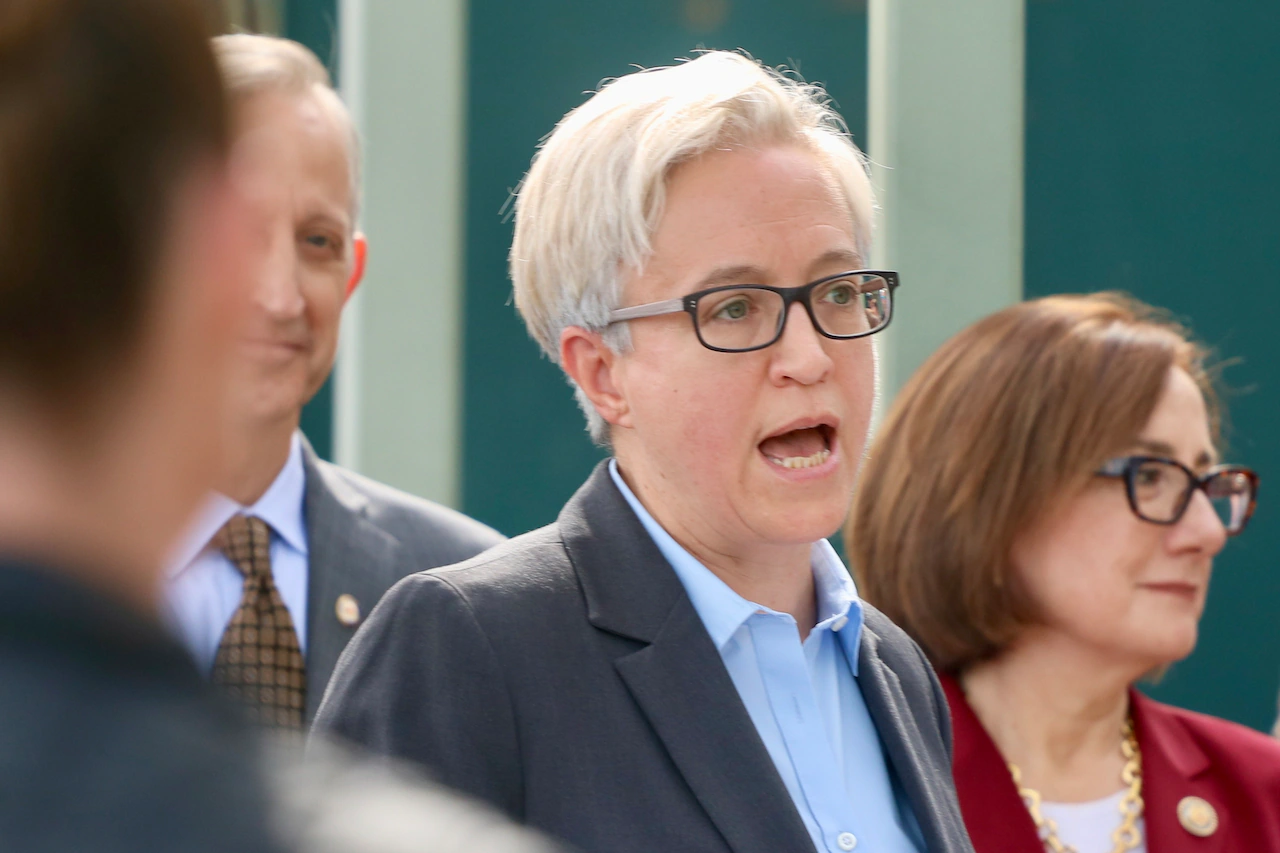
As the clock struck 12:01 a.m. Wednesday, the federal government officially shut down, with legislators unable to reach a compromise to keep funding flowing. By first light, impacts from the impasse began to arrive in Philadelphia, bringing the closure of some of the city’s most prominent attractions, and uncertainty for the thousands of federal workers in the region.
Independence Hall, where the country was birthed just shy of 250 years ago, was shuttered, and staffers at the Independence National Historical Park information desk were told to wrap up their shifts and head home. The Liberty Bell, which also falls under the National Park Service’s purview, was likewise closed off to visitors, the perpetual silence it has endured since 1846 amplified amid the shutdown’s imposed solitude.
“What a shame we couldn’t get up close and see it,” said history buff Gloria Isaza, 60, who was visiting the city from her native Columbia. “It’s sad.”
» READ MORE: Tourists in Philly feel the shutdown impacts: Closed sites, unanswered phones, confusing updates
Federal workers’ futures unclear
As tourists lamented the shutdown’ effects, the region’s more than 46,000 federal workers faced an unstable future. Some have been furloughed, while others , such as TSA employees and air traffic controllers at Philadelphia International Airport, are considered essential , and will be required to continue working despite the shutdown and temporarily suspended pay.
And while operations at the airport continued to run smoothly Wednesday morning, morale among its hundreds of TSA workers was “dropping lower than the normal low,” said Joel Shuker, vice president of AFGE Region 7, the union that represents those employees.
“We have a young workforce that lives check to check and and are concerned about not getting paid on payday,” Shuker said.
A number of other federal workers — including members of the military, federal law enforcement, and employees at the Centers for Disease Control and other federal agencies — are in a similar boat. President Donald Trump’s administration, meanwhile, has directed federal agencies to prepare layoff plans that are separate from the typical temporary furloughs that take place during a shutdown, and Vice President JD Vance warned Wednesday of firings being “imminent.”
“Let’s be honest, if this thing drags on for another few days or, God forbid, another few weeks, we are going to have to lay people off,” Vance said during a visit to the White House briefing room. The White House has not yet outlined any specifics on the potential number of layoffs, or said who specifically might be impacted.
Roughly 750,000 federal workers were expected to be furloughed. The Environmental Protection Agency, for example, says that almost 90% of its employees are to meet that fate. And nearly all civilian workers at Joint Base McGuire-Dix-Lakehurst were furloughed Wednesday, with exceptions including a “minimum number” needed for fire, emergency, and other services for the base, a spokesperson said.
Many offices will be shuttered, and the president vows to “do things that are irreversible” to punish Democrats. The economic fallout is expected to ripple nationwide.
“I certainly pray they will come to their senses,” House Speaker Mike Johnson said, flanked by GOP leaders at the Capitol.
» READ MORE: On day one of shutdown, Philly’s federal workers faced chaos, uncertainty, and looming layoffs
Still operating in the shutdown
Despite the shutdown — the first since a 2018-19 funding lapse that lasted 35 days — some federal apparatuses remained open in the Philadelphia region. Federal courts, for example, were expected to operate at full capacity through at least Friday. They will dip into a reserve balance of court fees and other revenues that are not appropriated by Congress, but it remained unclear how long the courts would be able to operate. Federal prosecutors, the Department of Justice said last week, are expected to continue working on criminal cases “without interruption.”
Also continuing their work are Immigration and Customs Enforcement agents, with most of the agency’s work having been deemed essential. Immigration Court in Philadelphia also remains open, and U.S. Citizenship and Immigration Services, which administers the nation’s legal-immigration system, is expected to remain operational, as much of its funding comes from fees rather than Congress.
» READ MORE: ICE will continue enforcement amid shutdown, while other parts of the nation’s immigration system may slow
The Medicare and Medicaid health care programs are expected to continue, though staffing shortages could mean delays for some services. The Pentagon would still function, and Social Security benefits will continue to be paid. Most employees will stay on the job at the Department of Homeland Security.
Likewise, the government shutdown is unlikely to have an immediate impact on government services provided by Philly’s suburban counties, which are already managing a loss of funding from the state government amid a budget impasse.
Josh Maxwell, a Democrat who chairs the Chester County Board of Commissioners, said the county had prepared for the possibility of a shutdown and the biggest impact to the county and its residents would be the inability to reach federal agencies.
Political blame game
Despite minor fallout to government operations, officials in the blue collar counties were quick to assign blame for government dysfunction at the state and federal levels.
“One party controls each branch of the federal government and the PA Senate. It’s no coincidence that we don’t have a state budget, and now we no longer have a federal one. We need these Republican caucuses in government to get their act together, and to realize that every constituent is hurt by their failure to govern,” said Monica Taylor, a Democrat who chairs the Delaware County Council.
» READ MORE: Pennsylvania faces a ‘double-whammy’ of government dysfunction
The blame game between Democrats and Republicans was mirrored at the federal level Wednesday, with neither side having devised an easy off-ramp to prevent what could become a protracted closure. Democrats are demanding funding for healthcare subsidies that are expiring for millions of people under the Affordable Care Act, causing the insurance premiums to spike. And Republicans have refused to negotiate and have encouraged Trump to steer clear of any talks.
On a call with constituents Tuesday night, just hours before Congress passed its deadline to fund the government, Sen. Andy Kim gave an emotional, 20-minute explanation for why he sees the shutdown as a pivotal moment for Democrats to fight back against Trump.
“Look, this is going to be a challenge going forward, but it’s a lot that’s at stake,” Kim said. “I think it’s worth fighting for people’s healthcare. I think it’s worth fighting for people to have affordability in their lives and to fight against the lawlessness that’s out there.”
Democrats are making a pitch that their stance is about protecting healthcare and pushing back on Trump and Republicans, who control Congress. Republicans, in turn, blame Democrats for not backing a budget plan that needed seven Democratic votes to pass. Kim voted against a GOP plan that would have funded the federal government through Nov. 21 on Tuesday.
Senate to return Friday
Senators once again failed to pass that short-term funding bill Wednesday, with only two Democrats — Sen. John Fetterman (D., Pa.) and Sen. Catherine Cortez Masto (D., Nev.) — and and Sen. Angus King (I., Maine) joining Republicans in its favor. The GOP needed 60 votes for the measure to pass, and ended with just 55, falling just short of a solution, however temporary.
The Senate adjourned for the day on Wednesday with no resolution on how to reopen the government. Senators will return Friday, after a break for the Jewish holiday of Yom Kippur, to vote again on the GOP measure.
Now, with the shutdown in effect, it remains unclear when the federal government will be fully funded once again — or what will happen as it wears on.
“We are all here working, but not really sure how long this is going to last,” one Center City-based employee at the EPA, who asked to remain anonymous due to retaliation fears, told The Inquirer. “So everyone has a lot of questions, and senior management has no answers.”



